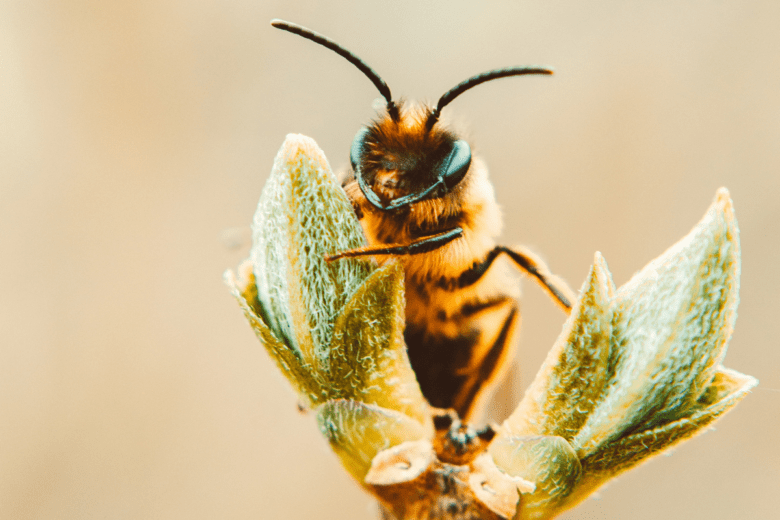Bees play a pivotal role in maintaining the health of our ecosystems and securing global food production. Often overlooked due to their small size, these industrious insects are indispensable in the process of pollination, which is crucial for the reproduction of many plants. Pollination is the transfer of pollen from the male parts of a flower to the female parts, enabling fertilization and the production of seeds. Without bees, many of the crops we rely on for food would fail to produce the fruits and vegetables essential to our diets.
Bees are responsible for pollinating approximately 75% of the leading food crops worldwide, including apples, almonds, blueberries, and cucumbers. Their activity supports the growth of plants that provide habitats for other wildlife and contribute to the complex web of life in various ecosystems. Furthermore, the economic value of bees’ pollination services is estimated to be in the billions of dollars annually, underscoring their importance not only to biodiversity but also to human agriculture and economy.
Despite their critical importance, bee populations are facing significant threats. Habitat loss, pesticide use, climate change, and diseases have all contributed to declining bee numbers globally. This decline has alarming implications for food security and biodiversity, making the conservation of bee populations more crucial than ever. Understanding the fundamental role of bees and the challenges they face is the first step in recognizing the urgency of protecting these vital pollinators.
The Pollination Process: How It Works
Pollination is a critical biological process that allows plants to reproduce and bear fruit. It begins when bees collect nectar and pollen from flowers. As bees move from one flower to another in search of nectar, pollen grains stick to their bodies and are transferred to the stigma of the next flower they visit. This transfer of pollen fertilizes the flower, enabling it to produce seeds and fruit. Bees are particularly effective pollinators due to their behavior of visiting multiple flowers in a single foraging trip, ensuring cross-pollination, which increases genetic diversity in plants.
Types of Bees and Their Roles in Pollination
There are over 20,000 species of bees, each playing a unique role in pollination. The most well-known are honeybees, which are highly efficient due to their social structure and large colonies. Bumblebees are also excellent pollinators, especially in colder climates and for certain crops like tomatoes that require buzz pollination. Solitary bees, such as mason bees and leafcutter bees, are vital for pollinating specific plants and are often more effective than honeybees on a per-bee basis. Understanding the diverse roles of different bee species helps in developing strategies to support their populations.
Economic Impact of Bees on Agriculture
Bees contribute significantly to the economy by enhancing agricultural productivity. Their pollination services are essential for the production of a wide variety of fruits, nuts, and vegetables. Crops like almonds, which depend almost entirely on bee pollination, are a prime example of their economic value. The total economic impact of bees is estimated to be in the billions of dollars annually, highlighting their importance to both local and global food systems. Without bees, the yield and quality of many crops would diminish, leading to higher food prices and reduced food security.
Bees’ Contribution to Biodiversity
Beyond their role in agriculture, bees are key players in maintaining biodiversity. By pollinating a wide range of plants, they support the growth of vegetation that provides food and habitat for countless other species. This intricate web of interactions helps sustain ecosystems and the variety of life within them. Bees ensure that wild plants reproduce, which in turn supports herbivores, predators, and decomposers, maintaining ecological balance. The decline in bee populations can disrupt these relationships, leading to negative effects on biodiversity and ecosystem health.
Challenges and Threats to Bees
Bees face numerous threats that have contributed to their decline. Habitat loss due to urbanization and agricultural expansion reduces the availability of flowers and nesting sites. Pesticides, particularly neonicotinoids, have been shown to harm bees’ health and navigation abilities. Climate change alters the timing of flowering plants, disrupting the synchronization between bees and their food sources. Additionally, diseases and parasites, such as the Varroa mite, weaken bee colonies. Addressing these challenges is crucial for the survival of bee populations and the ecosystems they support.
Consequences of Declining Bee Populations
The decline in bee populations has serious implications for both the environment and human society. Reduced pollination services can lead to lower crop yields and quality, affecting food availability and prices. The loss of bees also threatens the health of ecosystems, as many plants rely on them for reproduction. This can lead to a decline in plant species and the animals that depend on them. In the long term, the collapse of bee populations could result in significant ecological and economic disruptions, underscoring the need for urgent conservation efforts.
Conservation and Protection Efforts for Bees
Conserving and protecting bees involves a combination of strategies. Creating and preserving habitats with diverse flowering plants provides bees with food and nesting sites. Reducing the use of harmful pesticides and promoting integrated pest management can mitigate chemical threats. Supporting organic farming practices and establishing wildflower corridors can enhance bee-friendly environments. Research into bee health, breeding resilient bee strains, and raising public awareness are also vital components of conservation efforts. These actions help ensure the survival and prosperity of bee populations.
The Role of Gardens and Urban Areas in Supporting Bees
Urban areas and gardens can play a significant role in supporting bee populations. Planting a variety of native flowers that bloom throughout the growing season provides continuous forage for bees. Avoiding the use of pesticides and creating bee habitats, such as bee hotels and nesting sites, can enhance urban environments for bees. Community gardens, green roofs, and urban parks can serve as valuable refuges for bees, contributing to their conservation. Encouraging urban residents to participate in bee-friendly practices fosters a collective effort to support pollinator health.
How Everyone Can Help Bees: Individual and Collective Actions
Individuals can take several actions to support bee populations. Planting bee-friendly gardens with a diversity of flowers, avoiding pesticides, and providing water sources can create supportive habitats. Educating others about the importance of bees and advocating for policies that protect pollinators are powerful ways to contribute. Supporting local beekeepers and buying organic produce reduces the demand for harmful agricultural practices. Collective actions, such as participating in citizen science projects and supporting conservation organizations, amplify the impact of individual efforts, creating a more bee-friendly world.
These sections provide a comprehensive overview of the importance of bees in pollination, the challenges they face, and the steps we can take to support their populations. Let me know if you have any adjustments or additional points you would like to include!
The Importance of Bees and Our Responsibility
Bees are not just small insects buzzing around our gardens; they are vital to the health of our planet and the sustainability of our food systems. Their role in pollination is indispensable, affecting a vast array of plants, from wildflowers to the crops that form the backbone of human diets. The intricate process of pollination that bees facilitate ensures the reproduction of plants, supports biodiversity, and bolsters agricultural economies. Without bees, the ripple effects on ecosystems and human life would be profound and far-reaching.
The economic contributions of bees underscore their importance beyond ecological health. The agricultural sector relies heavily on bee pollination for the production of many fruits, vegetables, and nuts, translating into billions of dollars annually. The decline in bee populations poses a direct threat to food security, potentially leading to higher food prices and decreased availability of nutritious produce. Thus, protecting bees is not just an environmental issue but a matter of economic and social importance as well.
Despite their crucial role, bees face numerous threats that endanger their populations. Habitat loss, pesticide use, climate change, and diseases collectively contribute to the decline in bee numbers. These challenges highlight the urgency for concerted conservation efforts. Protecting bee habitats, promoting sustainable agricultural practices, and reducing pesticide use are essential steps toward ensuring the survival of these vital pollinators.
Every individual has a role to play in supporting bee populations. By making small changes, such as planting bee-friendly gardens, avoiding pesticides, and raising awareness about the importance of bees, we can collectively make a significant impact. Supporting local beekeepers and choosing organic products also contribute to creating a more sustainable environment for bees.
In conclusion, the importance of bees cannot be overstated. They are a keystone species whose health reflects the broader health of our ecosystems. As stewards of the planet, it is our responsibility to protect and nurture bee populations. Through individual actions and collective efforts, we can help ensure that bees continue to thrive, securing a healthy and sustainable future for both nature and humanity. The time to act is now, and our commitment to safeguarding bees will pave the way for a brighter, more balanced world.

Hi, I’m James Stevan, an avid beekeeper with over a decade of experience in apiculture. My passion for bees drives me to share practical tips and insights on sustainable beekeeping. Join me as we explore the fascinating world of bees and their crucial role in our ecosystem.




